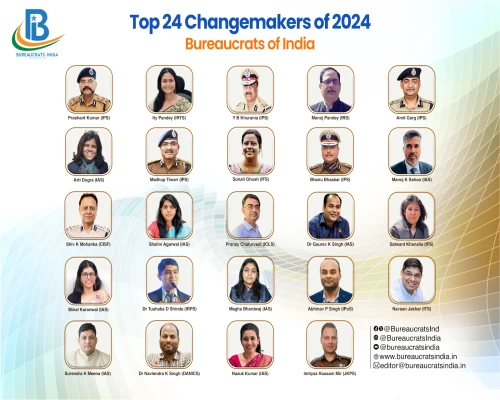
Bureaucrats India LEAD, launched in July 2024, is a series of programmes on higher education showcasing India’s unique capabilities in providing world-class education across diverse fields, from engineering and management to biotechnology, humanities, law, medicine, and sciences. Our higher education space is among the most vibrant, with sterling contributions from both private and public institutions, imparting world-class education and training to millions of students.
In the second episode of BI LEAD, we were honoured to feature Dr Sanket Goel, Dean (Research & Innovation) at BITS Pilani. Dr Goel holds a BSc from Ramjas College, Delhi University, an MSc from IIT Delhi, and a PhD from the University of Alberta. He completed a postdoctoral fellowship at Stanford University and worked at ASTAR, Singapore. Dr Goel has led transformative initiatives in research and innovation since joining BITS Pilani in 2015. His pioneering work in MEMS, microfluidics, and nanoelectronics has resulted in the development of cutting-edge smart sensors and energy harvesters. He has co-founded three companies—Cleome Innovations, Pyrome Innovations, and Sensome Innovations—to commercialise these technologies, paving the way for turnkey autonomous devices.
In an exclusive conversation with Dr Navneet Anand, Editor-in-Chief of Bureaucrats India, Dr Goel shared valuable insights into BITS Pilani's contributions to the education sector.
What is BITS doing in terms of keeping pace with the changing scenario? What are the new strides being made by BITS?
BITS Pilani is continually evolving to address the dynamic educational landscape. Over the past few years, we have established a robust framework for research and innovation. Currently, we are managing over 600 extramural projects funded by external agencies, valued at approximately ₹400 crore. Additionally, we are creating internal centres of excellence, each funded with at least a million dollars. Notable examples include the “Artificial Intelligence Research Centre of Excellence,” the “Centre of Research Excellence in Semiconductor Devices,” and the “Centre of Research Excellence in National Security.”
How does BITS compete globally, especially with the notion that higher education often meant going abroad?
While it’s true that many perceive studying abroad as a hallmark of quality education, BITS has made significant strides to create an appealing academic environment on our campuses in Pilani, Dubai, Goa, Hyderabad, and Mumbai. We emphasise flexibility in our curriculum, which allows students to experience a global education while remaining in India. Moreover, we have forged collaborations with various international institutions, providing students the opportunity to engage with global perspectives without leaving BITS.
How do you view the status of higher education in India today?
The status of higher education in India has markedly improved over the last few decades, particularly since liberalisation. Institutions are not only focusing on knowledge delivery but also emphasising research, innovation, and entrepreneurship. There is a growing expectation from society regarding educational outcomes, challenging us to meet those expectations. However, we still need to enhance self-discipline, professionalism, and hands-on training among students, integrating practical experience with theoretical knowledge.
What are some of the key future goals that you have set for your institution?
Our primary aim is to create a $100 million endowment fund over the next three years, with about 15 to 20% already generated. This fund will help support students in need. Additionally, we are focusing on enhancing our internal capacity to establish new centres of excellence. Our goals include bolstering academic rigour and advancing research, innovation, and entrepreneurship.
How is your institution leveraging technology to create a cutting-edge learning environment for students?
Technology is deeply embedded in the operations of BITS Pilani, from admissions to the entire student lifecycle. Our project funding is managed online, and our systems are entirely cloud-dependent. In the research and innovation division, we have established data depositories and analytics systems, allowing us to swiftly identify faculty members suited for specific proposals, ensuring efficient collaboration across the institution.
What are your personal thoughts about AI disrupting or enabling human thought processes?
AI serves as a level playing field, providing everyone with equal opportunities. Ultimately, AI is a tool to enhance efficiency in various operations. When employed correctly, it can become as integral to our lives as the internet, offering broad connectivity across numerous fields.
What is your view on the status of research in India?
India ranks third in research globally, behind China and the US, but the gap is significant. It's essential to appreciate our growth story rather than just compare current standings. During my visits to various tier B and C colleges, I’ve noticed a remarkable passion for knowledge and innovation among students. We must provide them with opportunities to develop their ideas and skills through hands-on experiences.
Tell us about your current focus in terms of academics and research.
Presently, our labs house three start-ups, all funded by various entities. We are determined to develop prototypes that are industry-ready, aiming for technology readiness levels of 3 to 4 to reach levels 6 to 9 in the next two years. It is crucial to not only conduct fundamental research but also create entrepreneurial opportunities that can directly benefit society.
What are your insights regarding the transition from 5G to 6G and the emergence of semiconductors?
The evolution from 5G to 6G and the advancements in semiconductors are closely linked. India should have developed its semiconductor capabilities two decades ago; however, it’s better late than never. Establishing in-house manufacturing and packaging plants will gradually lead to the development of silicon-based devices and chips. This capability is vital for India to become self-reliant in producing processors and devices.
BI Bureau



 (4) (1)_500_x_400.webp)
 (2) (1)_500_x_400.webp)



_500_x_400.webp)



_500_x_400.webp)